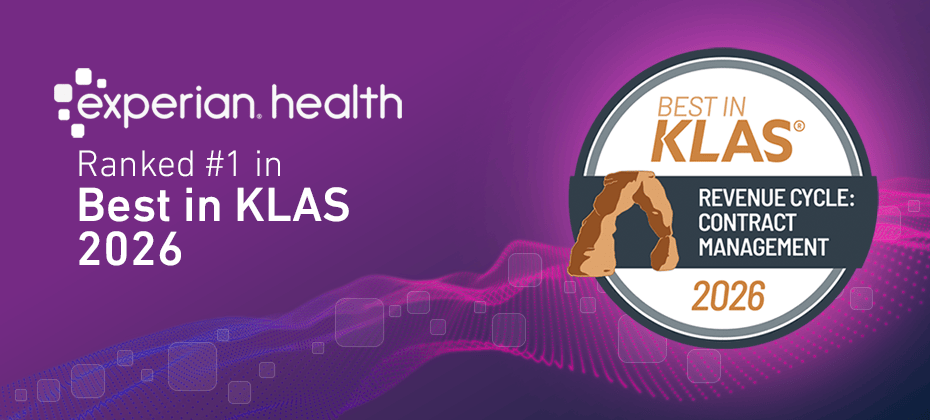
As 2023 draws to a close, revenue cycle leaders are in planning mode, reviewing financial performance, and gearing up for resource allocation negotiations in the new year. What should they be prioritizing? Three of Experian Health’s senior executives share their healthcare predictions for 2024 based on the latest healthcare trends, and the steps providers can take to maximize reimbursements in the year ahead.
Healthcare prediction #1: “Staffing shortages will persist, driving demand for technology-based solutions over traditional HR tactics”
According to Jason Considine, Chief Commercial Officer, the healthcare staffing shortage is unlikely to let up any time soon: “In our recent survey, we found that 100% of respondents are seeing ongoing shortages affect revenue cycle management and patient engagement. There’s an urgent need to address the problem, but too many providers are relying on traditional recruitment approaches that won’t give them the longer-term resilience they need. Heading into 2024, providers should leverage technology and data to alleviate the burdens on front and back-end operations and drastically improve efficiencies. This will better protect providers from the talent pipeline fluctuations that cause major disruptions.”
This healthcare prediction for 2024 is based on Experian Health’s staffing survey that was released in 2023. Participants in the survey agreed that the staffing crisis would continue, expressing concerns about its impact on revenue and patient engagement. For many, the culprit is high turnover rates. More than four in ten said turnover in their administrative teams exceeds 25%. Given the difficulties in finding skilled candidates and addressing staff burnout, it seems clear that traditional HR-based strategies will fall short. Despite this, salary increases, cross-training and incentives remain go-to responses.
Responding to the survey findings, Considine says, “It’s time to look at the many areas where automation – and even artificial intelligence – can stabilize, improve and optimize understaffed functions.”
One use case for artificial intelligence is in claims management. Experian Health’s AI Advantage™ solution uses historical and real-time claims data to identify claims that may be at risk of being denied. This allows staff to zero in on those claims and ensure all information is correct and complete before submission. It integrates seamlessly with ClaimSource® to augment the claims workflow, so staff can focus on claims and denials with the highest likelihood of payment. As well as alleviating pressure on staff, it reduces costs and maximizes reimbursements, helping providers to protect margins during uncertain times.
See how AI Advantage helps healthcare organizations reduce and prevent claims denials.
Prediction 2: “Patients’ changing digital expectations will prompt more providers to adapt (and those that don’t will risk losing market share)”
Clarissa Riggins, Chief Product Officer, says that patients are increasingly likely to expect a better “digital front door” experience, and will start to look elsewhere care if they encounter too much friction: “Patients have increasingly high expectations for easy and efficient tech-enabled solutions when it comes to accessing healthcare services. They seek convenient self-scheduling options, accurate cost estimates, and the ability to pre-register through their smartphones. We’re seeing a continuing trend in the number of patients who say they’d switch providers if the digital front door isn’t open.”
That healthcare trend was evident in Experian Health’s State of Patient Access 2023 survey, which showed that 56% of patients who had seen a deterioration in the patient access experience would switch providers because of it.
Demand for more digital options can be traced back to the “Amazon effect” and the rise of online retail environments that give consumers convenience and choice at the tap of a button. Indeed, healthcare providers stepped up during the pandemic to deliver flexible, contactless care, so patients have seen that it’s possible. With digital transactions now well-established, patients will find it surprising to be asked to fill out paper forms at the registration desk or have limited online payment options in 2024.
Riggins says providers must update their technology or risk being left behind. “Clients who are making the switch to digital patient access offerings tell us they don’t want to look stuck in the 90s. They want a more contemporary patient experience that’s smoother and more efficient for both patients and staff.”
To open the digital front door and keep up with healthcare predictions in 2024, Riggins recommends prioritizing self-service and digital options for patient registration, scheduling and billing inquiries.
Prediction #3: “More patients are struggling financially, so providers will need to do more – and sooner – to help them manage bills”
Victoria Dames, Vice President of Product Management, says that with household finances under pressure, patients will remain anxious about the cost of care: “The earlier providers can give patients clarity, the better for all involved. Creating a convenient and transparent patient collections experience should begin during patient onboarding, so patients can start to plan. With integrated patient access software, providers can deliver a more compassionate and efficient collections process, which supports patients while accelerating the revenue cycle. They don’t have to choose between prioritizing revenue and patient experience – patient access technology delivers on both.”
Recent Experian data suggests that many Americans are not confident in their financial literacy. This does not bode well for their ability to navigate the increasingly complex processes involved in healthcare billing. The troubling health consequences are already evident: a 2023 Gallup poll revealed that record numbers of patients were putting off medical care because they were worried about the cost. Anything providers can do to simplify the payment process is going to improve access to care and minimize bad debt, as noted in Dames’ healthcare predictions for 2024.
Dames says the collections effort should be viewed as an ongoing interaction with patients, beginning in patient access: “Patient access is where providers begin collecting data, confirming insurance eligibility, and providing accurate patient estimates. Completing these actions successfully at the beginning of the patient journey, with compassionate and frictionless patient interactions, can facilitate payment and collections downstream.”
A better financial experience in 2024 should include self-service and digital tools that guide patients through each step of their financial journey. For example, PatientSimple® gives patients a user-friendly, comprehensive way to generate price estimates, apply for charity care, set up payments plans and even make payments, all through a single web-based portal. Patient Payment Estimates deliver accurate pre-service cost estimates through the patient’s preferred channels and point them toward any appropriate financial assistance. And of course, offering a wide range of convenient and flexible payment options will promote timely payments and maximize collections.
Learn more about our revenue cycle management solutions or contact Experian Health today to discuss how we can support your strategies, based on our healthcare predictions for 2024.


